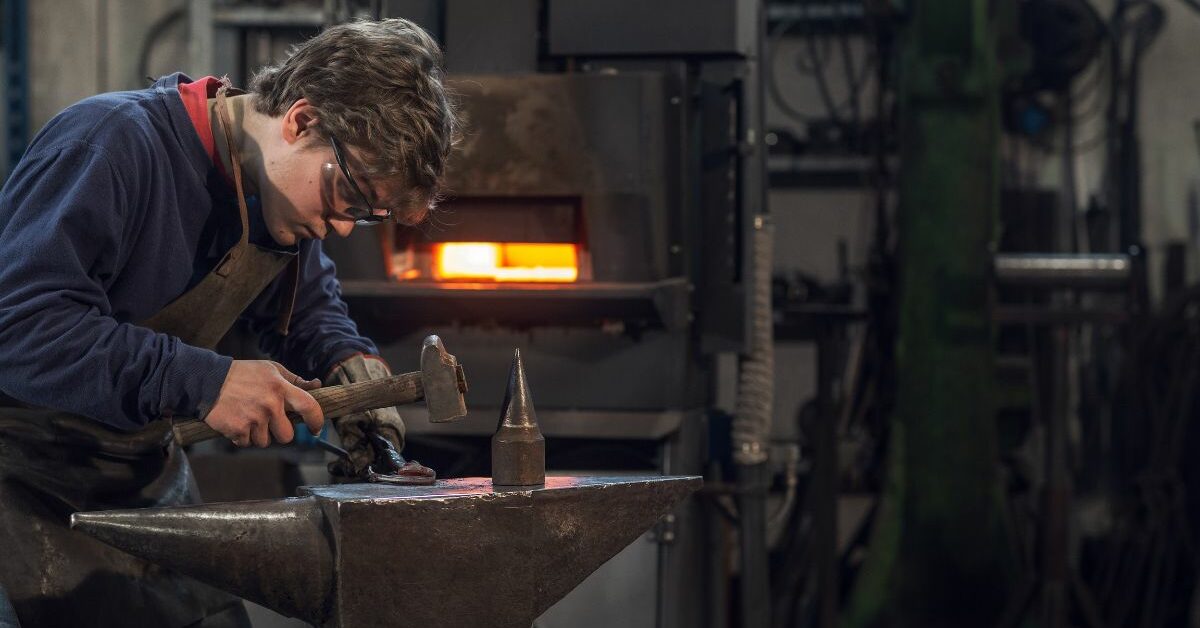How To Become A Blacksmith?
If you’re interested in learning how to become a blacksmith, you’re in the right place. Blacksmithing is an ancient craft that has been around for centuries and is still relevant today. The ability to create tools, weapons, and decorative items by hand is a valuable skill that can lead to a rewarding career or hobby. In this article, we’ll explore the steps you need to take to become a blacksmith, the skills required, what a blacksmith is, and the benefits of working as one.
Steps To Becoming A Blacksmith
Blacksmithing is a fascinating craft that has been around for centuries. It involves heating and shaping metal into various forms and objects. If you’re interested in becoming a blacksmith, here are some steps to get you started:
- Educate Yourself
Before you start hammering away at hot metal, it’s important to educate yourself on the craft. There are several ways to do this, including attending workshops, taking classes, reading books and online resources. You can also find tutorials and instructional videos on YouTube and other online platforms. Learning the basics of blacksmithing, such as heating techniques, hammering skills, and metal properties, will help you become a successful blacksmith.
- Acquire Tools of the Trade
Once you have an understanding of blacksmithing, you’ll need to acquire some tools of the trade. It’s important to start with the basics, such as a forge, anvil, hammers, tongs, and other essential equipment. You can purchase these tools online or from a local blacksmithing supply store. It’s essential to invest in high-quality tools that will last you a long time and make your work more efficient.
- Practice the Craft
Practice makes perfect, and this is especially true for blacksmithing. Once you have your tools, you can begin practicing the craft. This involves using your tools to shape and manipulate hot metal, developing your hammering and heating techniques, and understanding how different metals react to heat. It’s a good idea to start with simple projects, such as creating hooks or nails, and work your way up to more complex pieces like knives and swords. Don’t be afraid to make mistakes; they are a natural part of the learning process.
- Network with Other Blacksmiths
Another crucial step in becoming a blacksmith is networking with other blacksmiths. Joining a local blacksmithing guild or attending conferences is an excellent way to meet other experienced blacksmiths, learn new techniques and get feedback on your work. You can also join online forums and social media groups to connect with other blacksmiths from around the world. Networking with other blacksmiths will help you stay motivated, inspired, and connected to the blacksmithing community.
Becoming a blacksmith is a rewarding and fulfilling experience. With dedication, practice, and a passion for the craft, you can become a skilled blacksmith and create beautiful and functional objects from metal.
Skills Needed to Become a Blacksmith
One of the most important skills for a blacksmith is the ability to work with fire. Blacksmiths must be able to control the temperature of their forge and manipulate the flames to heat the metal to the desired temperature. This requires a deep understanding of the properties of different metals and how they react to heat.
Another skill that is essential for blacksmithing is the ability to read and interpret technical drawings and blueprints. Blacksmiths need to be able to understand complex designs and translate them into physical objects. This requires a high level of spatial reasoning and critical thinking skills.
Blacksmiths also need to be able to work with a variety of tools, including hammers, anvils, tongs, and chisels. They must be able to use these tools with precision and accuracy to shape the metal into the desired form. This requires a high level of hand-eye coordination and manual dexterity.
In addition to these technical skills, blacksmiths must also possess a strong work ethic and a commitment to excellence. The craft requires a great deal of patience, perseverance, and attention to detail. Blacksmiths must be willing to put in long hours and work through difficult challenges to achieve their goals.
Finally, blacksmiths must have a deep appreciation for the history and tradition of their craft. They must be willing to learn from the masters who came before them and to pass on their knowledge and skills to the next generation. This requires a deep commitment to the art of blacksmithing and a willingness to continue learning and growing throughout one’s career.
What is a Blacksmith?
In addition to the practical and decorative items that blacksmiths create, they also play a significant role in history. Blacksmiths were essential to the development of civilization, as they were responsible for creating weapons and armor for soldiers and warriors. Without blacksmiths, wars would have been fought with inferior weapons and armor, which could have changed the course of history.
Furthermore, blacksmithing is not just a job, but it is also an art form. Skilled blacksmiths can create intricate designs and patterns in metal, turning it into a work of art. They can also use different techniques to create unique textures and finishes, giving each piece a one-of-a-kind look.
Blacksmithing is a physically demanding job that requires strength, stamina, and precision. It is not just about hitting metal with a hammer; it is about understanding the properties of the metal and how it behaves under different conditions. Blacksmiths must also have excellent hand-eye coordination and be able to work with precision tools in a hot and noisy environment.
Despite the challenges, blacksmithing remains a popular hobby and profession. Many people enjoy the satisfaction of creating something with their hands and the sense of accomplishment that comes with completing a project. Blacksmithing is also a way to connect with history and learn about traditional crafts that have been passed down through generations.
Blacksmithing is a fascinating and complex craft that has played a significant role in history. It requires skill, dedication, and an understanding of the properties of metal. Blacksmiths create practical items and beautiful works of art, and their work continues to be appreciated and admired today.
The Benefits of Working as A Blacksmith
Working as a blacksmith can be a rewarding and fulfilling career or hobby. It allows individuals to create things of beauty and value using their hands and imagination. Blacksmiths have been around for centuries, and their work has played a significant role in shaping human history. From weapons and armor to horseshoes and tools, blacksmiths have always been an essential part of society.
One of the most significant benefits of working as a blacksmith is the opportunity to create something tangible. In a world where everything is digital and intangible, there’s something incredibly satisfying about creating a physical object with your own two hands. Whether it’s a beautiful piece of jewelry or a sturdy set of tools, the sense of accomplishment that comes with completing a project is unmatched.
Another benefit of working as a blacksmith is the opportunity to work with a wide variety of materials. Blacksmiths work with metal, wood, and other materials to create their products. This allows for endless possibilities in terms of design and functionality. Additionally, working with different materials can help to expand your skill set and make you a more versatile blacksmith.
With the demand for handcrafted products on the rise, the market for blacksmiths has grown, allowing several opportunities for work and profitability. Many people are willing to pay a premium for handcrafted items, and blacksmiths can take advantage of this trend by creating unique and high-quality products.
Furthermore, blacksmithing is an incredibly meditative and stress-relieving activity, offering an escape from the hectic pace of modern life. The process of heating, hammering, and shaping metal requires focus and concentration, which can help to clear the mind and reduce stress. Additionally, the physical exertion involved in blacksmithing can be a great way to stay in shape and improve overall health.
Blacksmithing is a fascinating craft that can lead to a fulfilling career or hobby. Whether you’re interested in learning the craft for personal growth or professional development, it’s essential to educate yourself, network with other blacksmiths, and practice regularly. By following these steps, you’ll be well on your way to becoming a skilled blacksmith and experiencing all the benefits that come with it.




